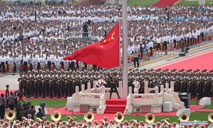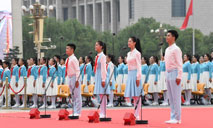New courses, facilities spark Xinjiang students' interest in astronomy
URUMQI, June 27 (Xinhua) -- On her way back to the dormitory every night, Li Zixuan usually spends five minutes observing the stars. And every Sunday, she would spend one and a half hours participating in astronomy club activities.
The 15-year-old considers astronomy to be a break from her long days of classes and homework, and, more importantly, a step toward her dream career in aerospace which will enable her to "make a difference" in the future.
"Sitting on the playground and staring at the pitch-black starry sky makes me realize I should always be humble in the vast universe, and the circumstances that used to bother me are no longer a big deal to me," she said.
Li added that she is now capable of recognizing some often visible stars as Liu Song, her astronomy guide and also her school's geography teacher, points them out to her using a laser pen. Liu has received training in astronomy and is able to offer information about the stars.
Li is a student at the Altay Prefecture No.2 Senior High School in northwest China's Xinjiang Uygur Autonomous Region and a member of the school's astronomy club, which was established in 2016 to popularize astronomical knowledge among students.
The club teaches students the basics of astronomy through activities such as lectures from astronomy experts from across China, discussions on interesting astronomical phenomena, and the observation of stars.
It's part of a broader effort by the school to help develop students' scientific literacy.
High atmospheric visibility, low levels of light pollution and an ideal number of clear nights make Altay an ideal location for people to stargaze without a telescope, according to Song Huagang, director of the astronomy education and popularization center at the Xinjiang Astronomical Observatory, under the Chinese Academy of Sciences.
The advantages prompted the school's principal Mo Lunbo to think about what he could do to offer an immersive environment inside the school, where students could keep up with their studies and start to ponder what they would do in the future.
Over the years, Mo has promoted the development of the school's astronomy education facilities.
He has communicated with teachers, experts and the local education authority to figure out how to build a base to popularize astronomy and educate teenagers in the field.
He took part in a general survey of astronomical resources across Altay in 2018 and visited professionals and projects across China, including the Beijing Planetarium and the Five-hundred-meter Aperture Spherical Radio Telescope (FAST), the world's largest filled-aperture and most sensitive radio telescope.
He later devised a plan to realize their ideas.
The school purchased various types of telescopes and other gadgets. To incorporate traditional astronomy, the school invited experts to build a solar calendar square on the campus, with 10 pillars surrounding the square to cast shadows that indicate the changes of solar terms.
"I think that learning astronomy could change their perspective on the world, ignite their imagination and cultivate a desire to explore the universe," said the principal.
Mo and other teachers are also considering including astronomy in the school's curriculum.
More institutes and departments in Altay and across Xinjiang have joined in on the efforts.
With a total investment of 67.79 million yuan (about 10.46 million U.S. dollars), Altay Prefecture's education bureau and the school have been working together to build an astronomy education and popularization base since 2019.
Covering more than 19,000 square meters, the base has nine separate function zones displaying the history of astronomy and basic information about Earth, the solar system, the galaxy and the universe, among other areas. The base will be put into use by the end of this year.
Zou Yun, director of the basic education office under Altay Prefecture's education bureau, said it is necessary to develop courses on astronomy as they will help students understand the ancient yet modern subject -- particularly those who have taken a liking to it -- and train a reserve of talent.
"We will continue to strengthen the construction of astronomy education infrastructure, enhance teacher training and develop courses," said Zou, adding that the educational practices will cover all primary and middle school students across the prefecture.
Photos
Related Stories
- 71-year-old Chinese farmer fascinated by astronomy builds observatory in mountain
- Special astronomical phenomenon seen in Nanjing
- Xinhua Insight: How China joins space club?
- Shanghai: Look at the stars that shine for you
- One in five Sun-like stars may have Earth-sized planets: study
- Exhibition held in Peru to mark coming Astronomy Day
Copyright © 2021 People's Daily Online. All Rights Reserved.










